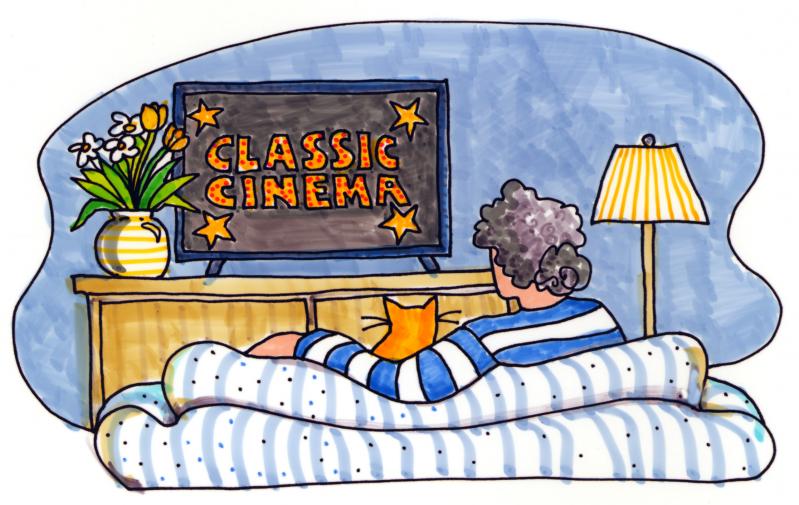Have you ever watched "Gone With the Wind" from beginning to end, all 3 hours and 40 minutes of it, in one sitting (bathroom breaks not included)?
Neither have I. Who had the time? Our generation was barely born, or much too young, to see it when it came out in late 1939; too cool as bobby-soxers, too busy with work and kids as young adults, and too involved with yoga and jogging and pets and golf afterward.
"Gone With the Wind" won every Oscar in sight -- best picture, best lead actress, best supporting actress, best director, best writing, cinematography, production design, film editing, and on and on. It might be a good idea now to put down the book and take another look. (By the way, "Gone With the Wind," unlike many other classics of its era, has never been remade, although its undeniably racist stereotypes have been somewhat tempered by a Black film scholar's new introduction to the film.) See it on Disney Plus or HBO Max.
This was supposed to be a compendium of not-to-be-missed films from the '30s, '40s, and maybe '50s, but truth be told, excepting maybe for King Kong and Snow White, the 1930s really don't deserve all that much ink. Along with some over-the-top Ziegfeld-y musicals and rudimentary westerns, the Depression-era decade gave us a lot of forgettable flicks designed to arouse social consciousness. Most of them sank like a stone.
The '40s were quite another story. The war years were notable not only for the introduction of wondrous Technicolor, but also for Charlie Chaplin's "Great Dictator," Orson Welles's "Citizen Kane," Disney Studios' "Fantasia," and everything directed by Alfred Hitchcock. After the war came film noir -- jarring tales of cynical detectives and faithless molls, or death's-head squads of unreconstructed Nazis bent on revenge -- as well as all those silly Crosby-Hope-Dorothy Lamour "Road" movies and some really great, if harebrained, comedies. Think Hepburn and Tracy.
Herewith, a few personal favorites.
"Notorious," 1946
Cary Grant, as a U.S. intelligence officer, recruits Ingrid Bergman, daughter of a convicted German-American World War II traitor, to infiltrate and report back on a ring of Nazi scientists hiding out in Rio de Janeiro, intent upon building a new Third Reich. Their leader, a rich German businessman, is her ex-boyfriend, and the ensuing romantic triangle -- Cary Grant, after all! -- seriously complicates her mission. To stay undercover, she has to marry the ex, and the jealousy of his controlling mother, a Hitler-loving matriarch who watches poor Ingrid with a gimlet eye, leads to attempted murder and an edge-of-your-seat ending.
"The Great Dictator," 1940
Speaking of Nazis: Long before Mel Brooks conceived of "Springtime for Hitler," Charlie Chaplin wrote, directed, produced, scored, and starred in his first "talkie," a wicked satire in which he plays both leading roles -- one, a dictator who, with his instantly recognizable little brush-mustache, is a dead ringer for Der Fuhrer; the other, a beleaguered Jewish barber. "The Great Dictator" came out not long before Pearl Harbor, when war was raging in Europe but this country was still at peace, and it is said to have played a big part in awakening the American public to the horrors of fascism.
"Gentleman's Agreement," 1947
Gregory Peck, as a reporter assigned to write about antisemitism, decides to do the story from the inside out. Pretending to be Jewish, he experiences rebuffs from every quarter -- nothing official, except in the fine print, just the inexplicable slamming shut of the doors to clubs, hotels, and jobs. His apartment building won't even let him put his name on his mailbox lest it be known that the building accepts Jewish tenants. (It reminded me of a man who liked to be called "the Squire of Hither Lane," Evan Frankel, who bought 11 acres there in the mid-'40s and had to have a gentile friend sign the contract.) "Gentleman's Agreement," a snapshot of a large contingent of our "Silent Generation," tells it like it was in prosperous postwar America.
"Fantasia," 1940
My parents took me to "Fantasia" when I was 4, likely assuming that it was just a longish Disney cartoon. It featured Mickey Mouse, all right, and Thumper the rabbit, and a cohort of dancing hippopotamuses, but what it really was and is, is a triumph of the imagination, a collection of animated interpretations of grand musical classics. Tchaikovsky's "Nutcracker Suite," danced by the Snow Fairies! Paul Dukas's "Sorcerer's Apprentice," with Mickey and his flood-making broom! Mussorgsky's "A Night on the Bare Mountain," dominated by the terrifying Chernabog, god of darkness and destruction! No, "Fantasia" is, as a 1941 critic declared, "ambrosia and nectar" for both grown-ups and kids. Disney Plus and a few other streaming services have the original. (Note: Scenes containing a centaur named Sunflower were considered racist by the late '60s. They were removed from the film's 1969 re-release, and have not been in subsequent releases.)
"Gaslight," 1946
Speaking of film noir, this one might top the list. A creepy predecessor of "Psycho," it's a tale of sadism, subliminal torture, murder, and avarice. Ingrid Bergman, this time playing an heiress and recent bride, won the best actress Oscar for her portrayal — from mild anxiety to outright panic -- of a woman bedeviled by incomprehensible happenings in her new home. Bumps in the night, pictures that move around the walls or vanish entirely, gaslights that go on and off on their own. Can her charming sociopath of a husband (Charles Boyer), who denies that any of these things are happening, actually be responsible? This film, by the way, is now being credited as the source for our verb "gaslight," meaning, roughly, to make someone question their own judgment or memory.

